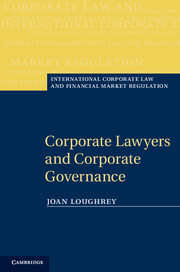Book contents
- Frontmatter
- Contents
- Preface
- Table of cases
- Table of statutes
- Table of statutory instruments
- International treaties
- List of abbreviations
- 1 Introduction
- 2 The international perspective
- 3 The roles of the corporate lawyer
- 4 Identifying the corporate client
- 5 The role of the corporate lawyer in intra-corporate litigation
- 6 The corporate lawyer as director
- 7 The regulation of the corporate lawyer
- 8 The case against reform
- 9 Reforming the role of the corporate lawyer
- 10 The reform of the legal profession and the role of the corporate lawyers
- 11 Conclusion
- Bibliography
- Index
11 - Conclusion
Published online by Cambridge University Press: 07 October 2011
- Frontmatter
- Contents
- Preface
- Table of cases
- Table of statutes
- Table of statutory instruments
- International treaties
- List of abbreviations
- 1 Introduction
- 2 The international perspective
- 3 The roles of the corporate lawyer
- 4 Identifying the corporate client
- 5 The role of the corporate lawyer in intra-corporate litigation
- 6 The corporate lawyer as director
- 7 The regulation of the corporate lawyer
- 8 The case against reform
- 9 Reforming the role of the corporate lawyer
- 10 The reform of the legal profession and the role of the corporate lawyers
- 11 Conclusion
- Bibliography
- Index
Summary
The question of what role corporate lawyers should play when dealing with their corporate clients and other corporate constituents is a complex one, with ramifications for the profession, companies, shareholders and third parties. It is not just about whether, and how, lawyers should respond to management misfeasance, although that is important. More mundanely it concerns how lawyers should guide these clients, when they should have regard to third-party interests, how they can avoid conflicts of interest, and the extent to which it is permissible for them to engage in creative compliance. The absence of any serious debate on these matters does the profession, its clients and the broader community a disservice. It means that the corporate profession's claims about its appropriate role have been accepted uncritically, as recent regulatory initiatives such as the Hunt and the Smedley reports have demonstrated. While many in practice may disagree with much of the discussion and suggestions made in this book, there should, at least, be a debate about whether the profession's claims are correct. The legal profession, and the corporate sector in particular, is too important to our society and economy to be beyond scrutiny or criticism.
The book has sought to address some of these issues.
- Type
- Chapter
- Information
- Corporate Lawyers and Corporate Governance , pp. 303 - 310Publisher: Cambridge University PressPrint publication year: 2011

